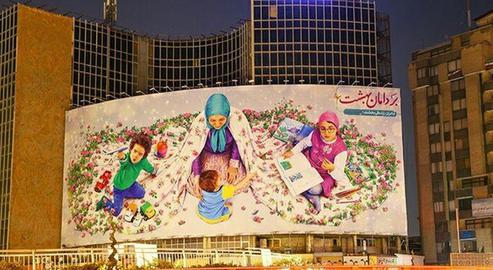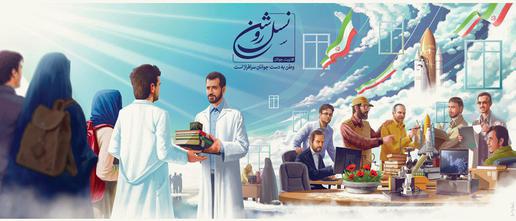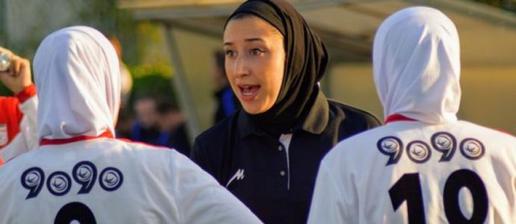Her face is not quite visible. She looks down at the little child sitting before her, supporting the child with her outstretched hand. The child has his or her back to the viewer and grasps the woman’s floral chador, which flows down from her shoulders, on to the floor and then transforms into a flower garden. A schoolgirl, a book on her lap and her hair covered, and a younger little boy playing with his toys both sit on the bed of flowers.
This is a description of a billboard in Tehran’s Valiasr Square to mark the Islamic Republic’s Women’s and Mother’s Day on February 26, which coincides with the birthday of Fatimah bint Muhammad, the daughter of the Prophet Mohammad, born in 615 AD.
The billboard — entitled “In the Lap of Paradise” — is a faithful representation of the Islamic Republic’s view of women. In spite of this, or perhaps because of it, it attracted widespread criticism from women’s rights activists and others on social media. “This mural has the same offensive view of women as the Islamic Republic,” one women’s rights activist told IranWire. “It views women as child production factories and believes that the perfect job for women is to keep house, take care of the children and bring them up.”
Worse than Humiliation and Insults
“I was heartbroken, sad and disappointed when I first saw it,” tweeted a woman who described herself as “a new mother, a teacher and a lover of movies and books” [Persian link]. “But when I looked carefully at my own situation and at the picture, I noticed that this billboard has not rejected, denounced or belittled anything. It has only ignored us, and getting ignored is [worse] than humiliation and insults.”
Shahindokht Molaverdi, President Rouhani’s former Vice President in Women’s Affairs, also commented. “The mural in Valiasr Square is a work by the Owj group, which always creates scandals by ignoring the role of women in society,” she wrote on her Telegram channel [Persian link]. "This time, however, it has paid attention to women — in the role of homemaker and mother, of course."
Though it claims to be a charity, the Owj Media and Arts Organization is affiliated with the Revolutionary Guards, and it regularly takes part in hardliner and conservative principlist propaganda campaigns. Among many other things, it was a sponsor for the 2016 Holocaust Cartoons contest. And Molaverdi’s reference to “ignoring women” concerns a billboard the organization put up at the same square to mark the occasion of Iran competing at the 2018 FIFA Cup in Russia. The billboard depicted a group of Iranian men from different ethnic groups holding up the championship cup and rejoicing, with the words “One Nation, One Heart, Champions Together” running underneath. But conspicuous in its absence was the representation of even a single woman in the group. This led to protests from activists and others on social media. How can we be “champions together” when you have omitted half of the Iranian people, they asked?
The protests spread so far that Fatemeh Zolghadr, member of the parliament, and Shahrbanoo Amani and Zahra Bahramnejad, members of Tehran City Council, called for the billboard to be removed. For a change, the criticism and the pressure worked and the billboard was covered up with another poster that portrayed a group of footballers singing the national anthem with their hands over their hearts standing next to a group of men and women.
But this second poster created another controversy. A photograph of the original design that went up on Instagram featured Masoud Shojaei and Ehsan Hajsafi, two members of Iran’s National Football Team. But the two did not appear on the billboard at Valiasr Square — Mehdi Taremi, another footballer from the national team, appeared in their place. This is because in August 2017, Shojaei and Hajsafi were both playing for the Greek team Panionios. When the squad faced the Israeli team Maccabi in the third qualifying round match in the Europa League, the two players defied the Islamic Republic’s “Israel ban” and played for their team as they were expected to do. Their defiance met with the wrath of the regime and they were suspended from the national team. After a period of time they were allowed to return — but now this recent censorship of their images from the billboard has angered many of their fans all over again.
The Enlighted (Male) Generation
But, undeterred, Owj did not change its ways. In January 2019, yet another billboard in Valiasr Square caused controversy after it belittled women. The poster, which was entitled “The Enlighted Generation,” showed a group of men in professional attire — military, medical, and managerial — apparently planning and building the future of Iran. No women appear among the group except two women looking on, literally on the margins, with their backs toward the viewer.
But if these previous billboards did not highlight women as the main subject, the newest billboard certainly does. So what is women’s contribution to society, according to this billboard? Being a mother, bringing up children and, of course, never forgetting to wear hijab even, it seems, in the privacy one's own home.
These days the Owj brand appears on many major cultural and artistic projects, from posters and music albums by the award-winning singer and actor Parviz Parastui, to the production of high-budget films. The Owj Media and Arts Organization came to public attention in late 2013 when, on the eve of the opening of nuclear negotiations between Iran and the West, anti-American billboards sprang up across Tehran. Owj commissioned the billboards, which depicted scenes that cast doubt on the sincerity and honesty on the American side of the negotiations. One of them showed the Americans adopting a diplomatic and pleasant look while pointing a gun at the Iranian side from under the negotiating table. In another, the Americans are seen holding a bag full of arms, a ferocious and mangy dog sitting next to them at the side of the negotiating table.
These billboards were taken down after a few days following pressure from the public, but similar campaigns against the US and, implicitly, against President Rouhani, continued. When Donald Trump began talking about leaving the nuclear agreement, Owj posters and billboards again appeared across Tehran. The point being made was that American policy toward Iran has always been the same but Trump was expressing it without trying to dress it up. In one of the posters, entitled “More Explicit than Ever,” the faces of recent American presidents were blurred, a portrait of Trump was superimposed over them.
Follow the Money
For a long time, Owj denied that it was affiliated with the Revolutionary Guards and insisted it was an NGO. But in February 2018, at the closing ceremonies for a festival called the Cinema of the Revolution, Ehsan Mohammad-Hassani, its executive director, dropped all pretenses and said: “I am proud to take money for our productions from the Guards and not from the embassies [of the countries] that support ISIS.”
The women’s rights activist IranWire spoke to gave her perspective on this. “It goes without saying that an entity that gets its money from the Revolutionary Guards must promote the official view of the Guards and of the regime,” she said. “It makes no difference what it is talking about — it might be about politics or it could be about one half of the people of the country.”
Related Coverage:
Iran’s Laws Against Women: Some Reforms but Discrimination Still Rife, December 7, 2018
Ayatollah Khamenei: Go Forth and Multiply!, October 31, 2017
23 Million Iranian Women Unemployed, July 7, 2017
The Stage Is no Place for Iranian Women, December 21, 2016
"Jackasses, children and women should not be allowed in parliament!", March 4, 2016
Cleric: “Women Stay Home While Men Work”, September 16, 2015
Going out? Ask your Husband First, September 15, 2015
The "I Love Hijab" Instagram Campaign, September 11, 2015
Judicial Official Defends Polygamy, February 5, 2015
Iran’s Gender Double Standards, October 20, 2014
Report Says Few Gains Made in Academic Freedom Under Rouhani, June 3, 2014
Let Women’s Talent for Housekeeping Bloom, April 22, 2014
visit the accountability section
In this section of Iran Wire, you can contact the officials and launch your campaign for various problems


























comments